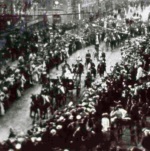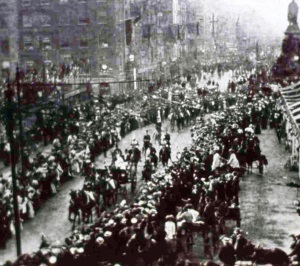The Royal Visit 1911
Published on 23rd September 2019
 King George V ascended to the British throne on the 6th of May 1911, following the death of his father, Edward VII. After being crowned in Westminster Abbey, George and Queen Mary embarked on a tour beginning in Ireland and ending in India. The Royal party landed in Kingstown on the 8th of July 1911, and such was the size of their entourage that eight carriages were required to transport the group into Dublin Castle, where they stayed during their time in the capital. While visiting, George attended races in the Phoenix Park and Leopardstown, visited the Coombe hospital and hosted a banquet in the castle, while he also visited Cork and Limerick, although the welcome given to the royals was noticeably less warm in those cities than it had been in Dublin.
King George V ascended to the British throne on the 6th of May 1911, following the death of his father, Edward VII. After being crowned in Westminster Abbey, George and Queen Mary embarked on a tour beginning in Ireland and ending in India. The Royal party landed in Kingstown on the 8th of July 1911, and such was the size of their entourage that eight carriages were required to transport the group into Dublin Castle, where they stayed during their time in the capital. While visiting, George attended races in the Phoenix Park and Leopardstown, visited the Coombe hospital and hosted a banquet in the castle, while he also visited Cork and Limerick, although the welcome given to the royals was noticeably less warm in those cities than it had been in Dublin.
The Irish Times reported that the offices of the Irish Lights Board on D’Olier Street, and Easons on Sackville Street, were heavily decorated with electric lights, while roses, shamrocks and thistles adorned the facades of the Theatre Royal and the Gaiety. The Royal Party was surrounded by members of the Irish Guards and, as had become tradition, a special medal was awarded to all Royal Irish Constabulary and Dublin Metropolitan Police who were on duty during the visit. It was also given to the harbour police and St John Ambulance brigade.
 Royal party crosses O’Connell bridge. The visit did not go unopposed. Dublin Corporation, dominated by nationalist councillors, did not play a part in the Royal Visit, and republicans were unsurprisingly against the whole thing. James Connolly wrote: ‘All these parading royalties, all this insolent aristocracy, all these grovelling, dirt-eating capitalist traitors, all these are but signs of disease in any social state – diseases which a royal visit brings to a head and spews in all its nastiness before our horrified eyes.’ With republicanism on the rise and revolution in the air, George would be the last British monarch to visit Ireland until Elizabeth II in 2011.
Royal party crosses O’Connell bridge. The visit did not go unopposed. Dublin Corporation, dominated by nationalist councillors, did not play a part in the Royal Visit, and republicans were unsurprisingly against the whole thing. James Connolly wrote: ‘All these parading royalties, all this insolent aristocracy, all these grovelling, dirt-eating capitalist traitors, all these are but signs of disease in any social state – diseases which a royal visit brings to a head and spews in all its nastiness before our horrified eyes.’ With republicanism on the rise and revolution in the air, George would be the last British monarch to visit Ireland until Elizabeth II in 2011.
Blogpost by: Bernard Kelly, Historian in Residence, Dublin City Library and Archive.